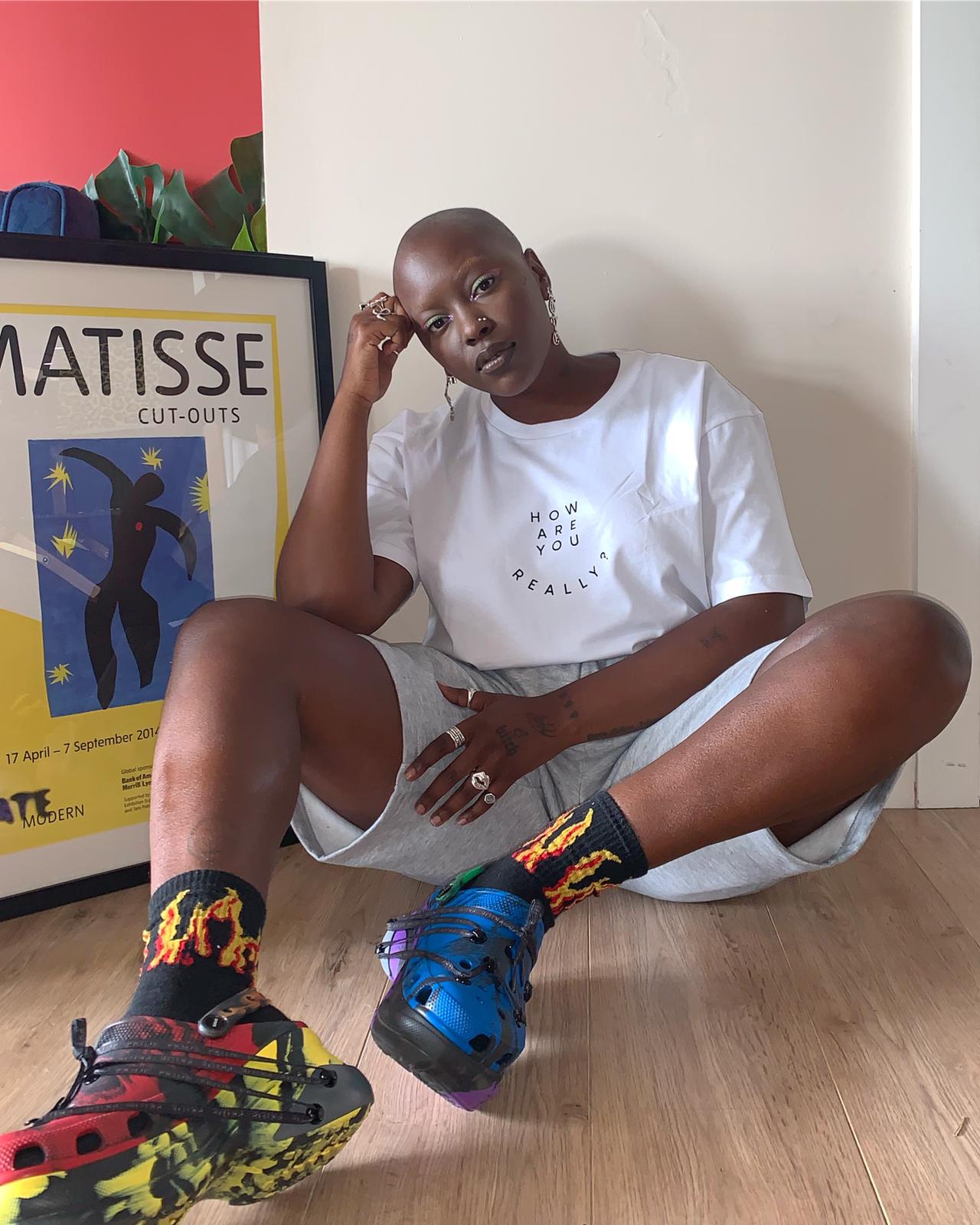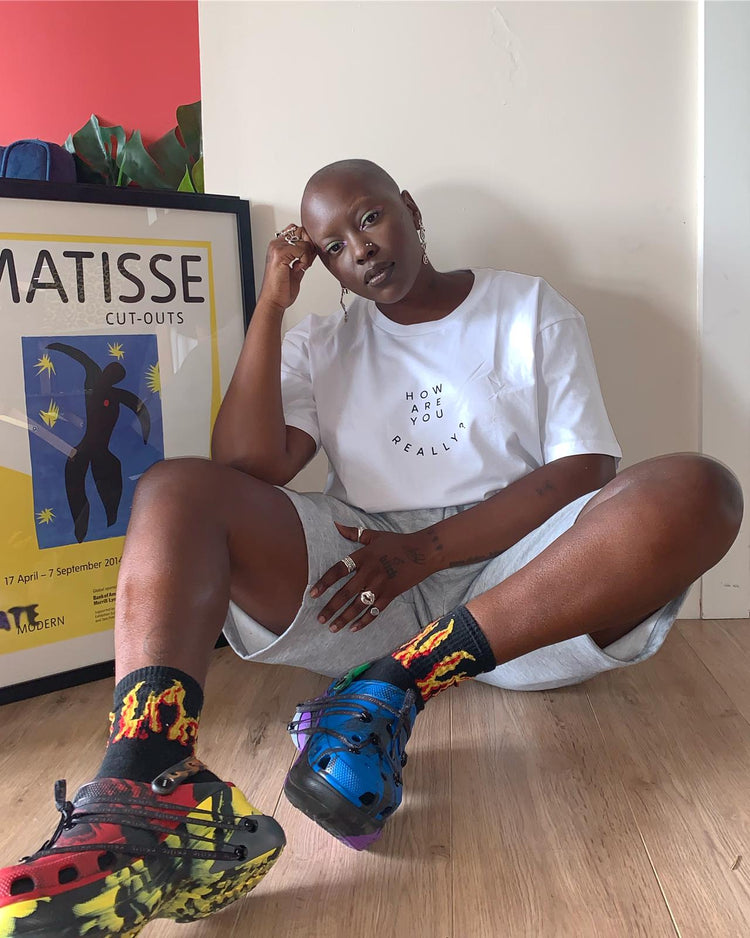Who I Am, Really: Char Ellesse
Model, content creator and founder of online platform girlswillbeboys, Char Ellesse reflects on the challenges of rejecting stereotypes as a queer black woman, and the chance friendship that changed her life.


For the third and final post in this year’s Pride series exploring past and present identity with our LGBTIQA+ community, we interview model, content creator and founder of online platform girlswillbeboys Char Ellesse about the challenges of rejecting stereotypes as a queer black woman, and the chance friendship that changed her life.
How did your childhood affect your journey in identity?
Me and a counsellor recently made the connection that for my entire childhood, I always felt too much or not enough in any situation. For example, in some I felt that I was too black for some of my white friends, and in other situations I felt like I wasn’t black enough. I’d been playing with this whole juxtaposition of identity since I was younger and because of that I constantly made myself palatable in all situations so I could be accepted by everyone.
I feel like that played into ideas growing up where I made a point of not wanting to be a stereotype. Where I was having feelings towards women, after I’d shaved my hair, I didn’t want to be the stereotype of a lesbian where I knew that people were assuming my sexuality anyway because of my haircut so I completely rejected coming out or attempting to date women or talking to anyone about it. I didn’t talk to friends about it either, but I mentioned small things.
How was coming out for you?
Me and one of my closest friends Floss have spoken about how “Oh, it’s a girl crush” maybe actually means you’re queer. After connecting on Instagram, we met for the first time two years ago and spoke about the fact that we were queer but we didn’t necessarily know for sure and we hadn’t outwardly been queer or dated women. It’s funny because we both fancied each other at the beginning and we didn’t know if it was a date! We decided to start the journey together because it’s quite daunting—I think I was 25 or 26 which seems like quite an old age to come out. I think that having someone else who was in the exact same position was nice as we could explore queer spaces together and learn from each other and check in on each other’s sexuality.
Luckily, with my friends I’d been quite good with who I surrounded myself with in knowing they’d accept me in all forms. I’m constantly refining and checking in on my friendship groups and because of that, I had good people around me.
In terms of my family, my sister came out at 16 but it was never a big conversation where it was like “I have something to tell you, I’m queer”, she just said that she might end up dating a woman or whoever, so because I’d seen how my parents reacted to that conversation, I knew it wouldn’t be a problem for me to talk to my family about it. It was more a pride thing within myself, especially being black when you’re constantly met with microaggressions. I’m seen as black before I’m seen as anything else so people already create an idea of me and I hated that so I wanted to be like “You probably think I’m queer, but I’m straight… but actually I’m queer”.
Do you think had you not formed that friendship with Floss, you might not have come out when you did?
One thousand percent. We’ve both said that. It took the same vulnerability to admit to ourselves and each other that we wanted to start this journey. I think when you meet people at a different level of the journey, it can still seem intimidating or it’s easy to feel like you don’t know what you’re doing. It was such a life change that it was nice to have someone hold my hand through it.
Did anything else have a pivotal impact?
I’m from Leicester and I moved to London when I was 18, so that was a whole journey of self-discovery in itself; moving to a city where you could be whoever you wanted to be. In Leicester, I felt like I was suppressing a lot of parts of who I was and not allowing myself to explore them. Because of the friends that I had, it was a very ‘small town, small mind’ attitude so I guess I hid it well. I wouldn’t bring up any conversations of anything to do with being queer but then I kind of brainwashed myself that I was straight so every time I went out, I wanted to seek a man’s approval and then when I didn’t get it, it was really detrimental to my self-worth. I was just going round in circles, questioning why it wasn’t working. I felt like I didn’t want to be a part of heteronormativity but it’s just part of the system.
The more I started to speak up on Instagram and then got jobs where I met more people, and being in London where you meet all kinds of people anyway, I saw the other side of life and started making a lot more friends who were queer. I was also living with my friends who are a lesbian couple, and being around them and seeing queerness in normal everyday life was a realisation that you’re not expected to be anything—it comes in all different forms.
What was the biggest factor holding you back?
I had a lot of internalized homophobia and ideas on what I thought being queer had to be and I thought I wouldn’t fit that box. I’m quite a stubborn person; I don’t like to be bad or inexperienced at something or not give something my all, and going into something new that was completely different from what I’d known for 25 years of my life was scary knowing that dynamics were going to be different. That’s what I was most scared of—not knowing what it was going to be like.
How do you feel your life changed when you came out?
It was like the missing piece to the puzzle. I didn’t think that something was missing but as soon as I said out loud that I identified with being queer, or not-straight, everything made sense. I posted something on Instagram the other day about the term misogynoir—there were all these things that I was experiencing but I didn’t know how to put a name to them. When I came out as queer, I felt like this was a person that I needed to allow myself to be.
I have these tiers of marginalisation by being a black queer woman but being queer is at the bottom because I’m not visibly queer and could be straight. Obviously that’s down to assumption and stereotype anyway, but first I’m seen as black, then as a woman, then people think about my sexuality so it doesn’t really affect anything nor is it at the forefront of conversation unless people want to know something or I get booked for jobs for being queer.
What would you say to people trying to come to terms with their identity?
Listen to your inner child. Think about what you needed as a kid and what you didn’t get enough of: you don’t have biased opinions and your opinions aren’t corrupted by the world when you’re younger. Even I’ve struggled with suppressing emotions but it’s ok to process things and when things are heavy, things are heavy. Let yourself feel, and you’ll know what to do. In terms of sexuality, I saw a quote from Munroe Bergdorf where she said that sexuality is an experiment, and that’s for everyone! The first time you kiss someone, no matter what gender they are, it’s an experiment. If you feel like you’re anything aside from straight, why not try it? Don’t deny yourself exploring all parts of you that come to the forefront at any time—always allow yourself to explore different parts of your identity and see where your comfortability sits at each point.
We’re donating 30% of profits from Friday 26th - Sunday 28th June to GLAAD plus $10 for every time the hashtag #whoiamreally is used. To get involved, use the hashtag #whoiamreally with a photo of yourself and your story of past and present identity.